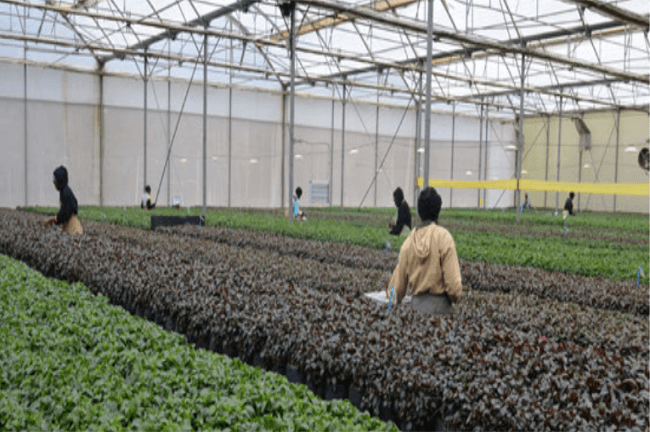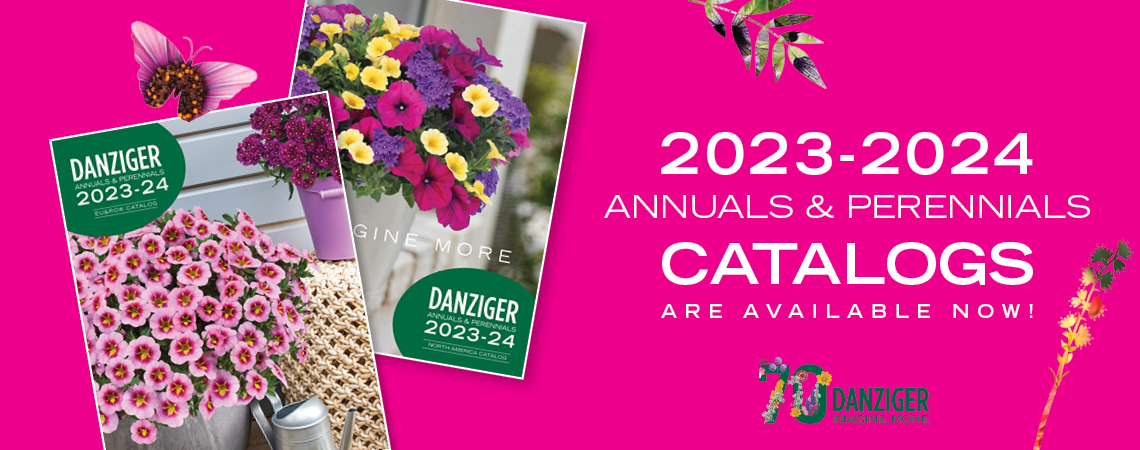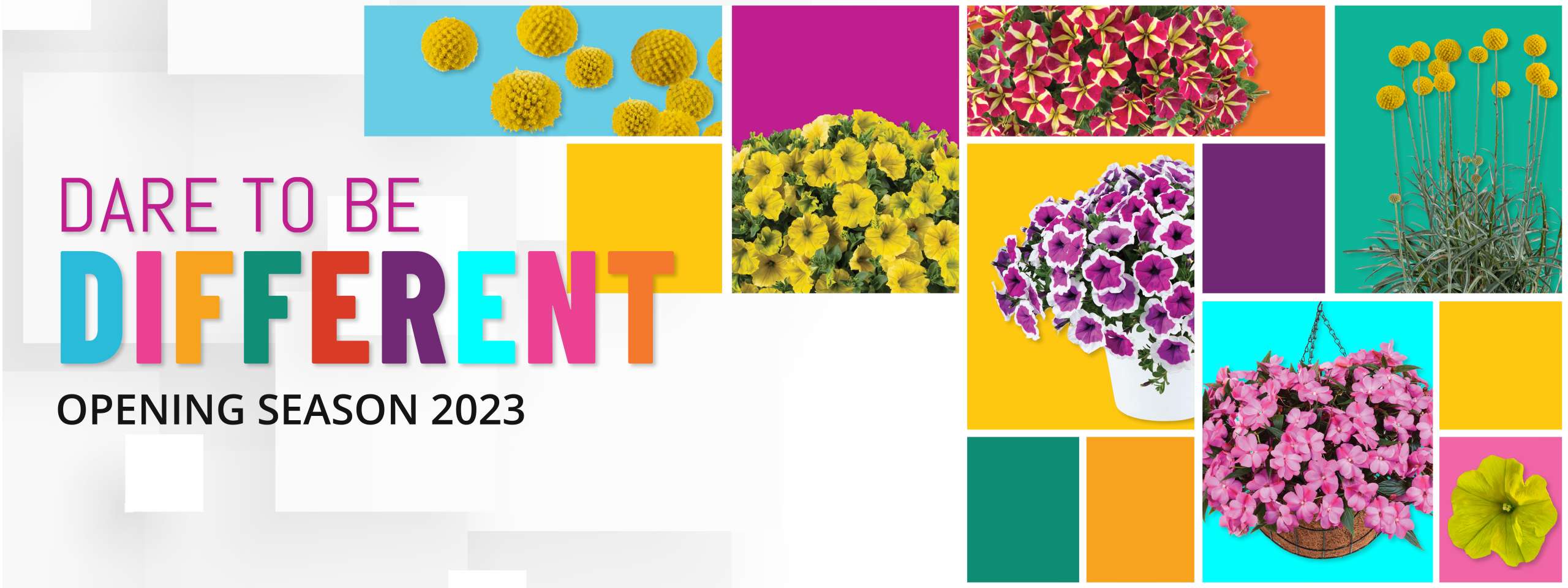Danziger operates advanced propagation facilities in Israel, Guatemala, Kenya, and Colombia – ensuring a continuous supply of clean, high-quality vegetative propagation material to around 1,000 customers in over 60 countries. The company supplies propagation material, in the form of cuttings, plants and in-vitro, via a highly- efficient cold chain distribution networks. All Danziger products adhere to strict propagation and distribution standards, as well as environmental, fair trade and fair work practices.
Danziger’s Brand Manager, Michal Shafransky Fridman, says that breeding is the core business, heart, and soul of the company. As such, almost all of the plants and flowers included in their product offerings are of their own breeding. “Having said that, our promise to the market and end consumers is product innovation. Living up to our ‘Imagine More’ slogan we added selected genetics from industry partners to our assortment. One example would be ThinkPlants™ NA, a brand that represents a team of breeders and top suppliers: Danziger, Syngenta, UNEX, and Kapiteyn. ThinkPlants™ is a platform that can help smaller independent breeders to bring their new genetics onto the market. The companies combined offer a wide and innovative range of plant genetics. Based on a collaborative market approach, ThinkPlants™ has access to a very diversified perennial portfolio, the best possible technical resources, an organized retail pursuit, and a consistent, streamlined supply chain.”
Danziger Kenya and Danziger Guatemala
A good idea is only the start. With this in mind, Danziger opened its wholly owned Daziger Kenay farm in 2001, located 40 km North East of Lake Naivasha, Kenya and Danziger Guatemala in 2013.
Uri Kamara, the company’s Global Operations and Bedding Plant Production Manager says, “Our main goal when choosing a production area is the overall parameters which will bring fresh and consistent product to the consumer, therefore proximity to the market, climate, and available workforce are key factors to success.”
Sustainability
With climate being one of the key elements in plant production, the question arises how serious the threat of climate change is? “Danziger’s production sites are spread around the world,” says Kamara. He continues, “This makes the company more flexible when dealing with unexpected weather conditions. Global presence also means shorter shipping distances and being more market-driven. We see changes in consumer preferences with a rising demand for heat-tolerant plants such as our Portulaca series – PAZZAZ NANO™. Lantana is another crop we think has huge potential. Our Lantana GEM™ series, for example, thrives in hot weather.”
Climate change, carbon footprint obsession, and sustainability go hand in hand. Does Danziger think in the long run society will continue to accept overseas production involving cheap labour and polluting air freight? Shafransky Fridman: “Production facilities in developing countries are supplying stable workplaces and open a world of possibilities for talented people. No doubt that it is our mutual goal to have a less polluted world with all countries working to decrease it.”
Being a plant producer, Danziger believes it is contributing to sustainability as the company promotes the presence of plants and flowers in our environment. Shafransky Fridman: “The more people buy flowering products for their home, balcony or patio, the bigger the contribution to clean air and decreasing environmental pollution.”
Meanwhile, there’s consumer pressure to minimize crop protection products while herbicide options are diminishing. “We build our greenhouses in such a way that plants can be kept as clean as possible. We use insect-proof netting and work under a strict protocols to reduce the chance of pest and disease penetrating the growing areas. We disinfect all our tools and machinery to minimize spreading of bacterial infections, viruses, weeds, and unwanted pests. Adhering to these protocols helped us significantly reduce the need to spray. We forecast years ago this trend in the industry and ceased using certain kind of chemicals that are unfriendly to the environment long before their use was forbidden,” says Kamara.
He adds that the company reuses and recycles at every opportunity resulting lower transportation costs.
Quality
Asked about the future of PGRs and the role of naturally dwarf cultivars ? “It has been one of our goals in breeding for the past few years to have a bestselling series that doesn’t need PGRs, like CAPELLA™ Petunia and NANO™ Portulaca with small-footprints,” says Kamara.
Providing quality plants is easier said than done, he continues, “We constantly look into research and investigate growth problems to make sure we are constantly improving. We make sure all growing stages are separated to keep the plant material clean. We conduct lab tests regularly. The company has three labs – a diagnostic one – that checks all the plant materials, the R&D lab that works in cooperation with our production teams for constant improvement and the tissue culture lab that makes sure our stock is clean. These labs work together with dedicated software that enables us to constant supply clean material.”
Air freight
Air freight rates and capacity are currently a big problem. “This is one of the reasons we have our production facilities next to consumer markets. We have built Danziger Guatemala to be closer to the NA market, while Danziger Kenya serves the European and Asian markets.”
In cold chain operations the company constantly tests and examines the packing and freezing/overheating issues. Our partners handling the shipment are long-term associates and good communication helps us deal with problems. In addition we have customised packing and shipping to more complex destinations,” says Shafransky Fridman.
Consolidation in the industry means Danziger and others have to grow, to cooperate and to innovate. The company sees it as ‘a form of competition that makes them better’.
If robots and automated greenhouse production are the new face of horticulture, Danziger says it is ready for the future. “We are a customer-oriented company and as such we provide our customer with required standard of cutting whether to be used in ISO or AutoStix machines or any other specific request. In addition, our breeding programmes are designed to take into consideration the growing demand for consistent and uniform products and the use of automatization and robotization in the production process. For example, creating crops suitable for mechanical harvesting requires a breeding programme innovative enough to come up with a variety suitable for such harvesting”, concludes Shafransky Fridman.










